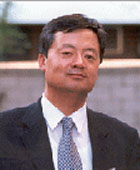Professor Myung-Haing Cho
The PhysOrg article Vaporized viral vector shows promise in anti-cancer gene therapy said
“A new lung cancer therapy employing a vaporized viral vector to deliver a cancer-inhibiting molecule directly to lung tissue shows early promise in mouse trials, according to researchers at the Ministry of Education, Science and Technology in Korea.Gene therapy is an area of great promise, but delivery mechanisms, which have included intravenous injection and intratracheal instillation, have proven problematic for effective delivery of genetic therapy to lung tissues.
‘Aerosol delivery targets the lungs specifically and represents a noninvasive alternative for targeting genes to the lung,’ wrote Myung-Haing Cho, D.V.M., Ph.D., professor at Seoul National University and principal investigator of the study. ‘The delivery of genes via aerosol holds promise for the treatment of a broad spectrum of pulmonary disorders and offers numerous advantages over more invasive modes of delivery.’”
Myung-Haing Cho, DVM, Ph.D. is Professor of Veterinary Toxicology at Seoul National University.
His research interests are pulmonary toxicology, nanotoxicology, and NT/BT fusion technology.
Myung-Haing coauthored Multifunctional Nanoparticles Possessing A “Magnetic Motor Effect” for Drug or Gene Delivery, Antimicrobial effects of silver nanoparticles, Toxicity and Tissue Distribution of Magnetic Nanoparticles in Mice, Resveratrol inhibits TCDD-induced expression of CYP1A1 and CYP1B1 and catechol estrogen-mediated oxidative DNA damage in cultured human mammary epithelial cells, A Novel Function of the MA-3 Domains in Transformation and Translation Suppressor Pdcd4 Is Essential for Its Binding to Eukaryotic Translation Initiation Factor 4A, and Chitosan-graft-polyethylenimine as a gene carrier.
Myung-Haing earned his MS at the Graduate School of Seoul National University, Korea in 1987 and his Ph.D. at the University of California, Davis, CA, USA in 1992. He holds patent application Gene therapy and pharmaceutical composition for prevention and treatment of lung cancer.
Read Common food additive found to increase risk and speed spread of lung cancer and Synthetic molecule causes cancer cells to self-destruct.
